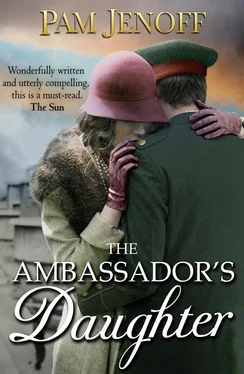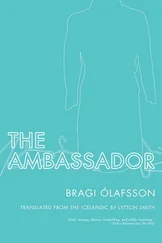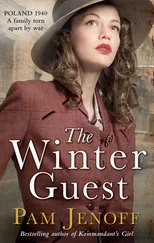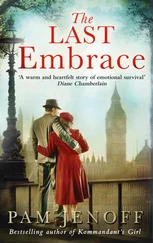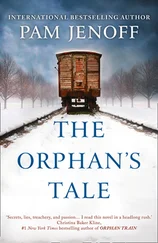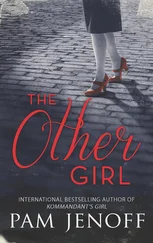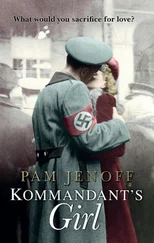Now my guilt rises anew: Should I have gone back to Berlin and taken Stefan from the hospital, cared for him myself? The hospitals themselves could be as dangerous as war—nursing care was short and supplies minimal even in the best hospitals. Influenza and tuberculosis were rampant.
If I went back to Germany now, perhaps I could get him out.
Unable to bear the cold any longer, I walk to the corner and hail a taxi. “Montparnasse,” I say to the driver and it is only then that I fully realize I am going to try to find Krysia. “Rue Vavin,” I add, recalling one of the major intersections. A few minutes later, I pay the driver and step out onto the pavement. The boulevard du Montparnasse is quiet at this early hour, the bars and cafés that seem to never sleep now briefly at rest. At La Closerie des Lilas, I peer through the glass into the darkened café. I push against the door expecting it to be locked, but it opens.
“Bonjour.”
“Oui?” I step inside, adjusting my eyes to the dim lighting. Ignatz is behind the counter, alone in the otherwise deserted room. Last time I was here the café felt almost magical, but in the crude light of day it is a dirty room, trash from the previous evening still littering the floor, ordinary in a way that makes me wonder if I imagined the revelry of the earlier night. “Ah, the ambassador’s daughter.” His tone is mocking.
I consider pointing out that the title more aptly describes Krysia than me, then decide against it. “Margot Rosenthal,” I correct.
“Mademoiselle Rosenthal.” He gives a mock bow, then throws a handful of spoons into one of the bins with a clatter. “Of course. How can I help you?” His voice is gravelly.
“Krysia … that is, I haven’t heard from her in a few weeks and I was worried.”
“I haven’t seen her. She’s sick. The grippe, or some such thing.”
So that is why she hasn’t contacted me. I’m relieved and concerned at the same time. “Is it serious?”
He shrugs. “I shouldn’t think so, or I would have heard. She’s got Marcin to look after her.”
His answer does little to assuage my fear. “I’d like to check on her if you’d be so kind as to provide her address.”
I hold my breath, expecting him to object, but he pulls out a scrap of paper and scribbles on it. “It’s not far from here. If you walk up rue d’Assas, you’ll find it just before you reach boulevard Saint-Germain.” He starts to slide the paper across the bar, then stops, leaving my hand dangling expectantly in midair. “I’m glad you’re here, actually.”
“Oh?”
Ignatz steps out from behind the bar. “ Oui . You had so many interesting things to say the other night.” He is larger than I remembered from last time I was here, reminding me of a grizzly bear.
Warmth creeps up my back. I never should have spoken about Papa’s work. I replay that night in the bar in my head, my tongue loosened by beer, too eager to say something meaningful and curry favor with the group. “It was nothing.”
“No, you had real views.”
I flush. “I never should have spoken at all.”
“Nonsense. Your wit added much to the discussion. But it also caused me to think, your contribution can be of most use to our cause.”
“I’m afraid I don’t quite understand.”
“As you may have gathered the other night, we’re interested in politics quite a bit. We’re more than just a ragtag group of artists and innkeepers. Some of us—not all but some—are actually doing something to further our beliefs in a just world.” What could they do, I want to ask. Write about freedom? Lobby for it? “You do believe that people should have the right to self-determination, don’t you?”
“Yes.” But I remember then my conversation with Papa about the limits of what could be done at the conference, the fact that not everyone’s claim to autonomy could be granted.
“We gather information, pass it on to Moscow or others who might be in a position to further those aims. You can help us if you’d like.”
I hesitate. What could I possibly do? He continues. “The information you shared about the Serbia vote was most helpful. If your father should say anything else …”
I cut him off. “He seldom speaks about his work.”
“Your father would not mind—ours and his cause are one and the same. I daresay he would want to help us himself, but for his position.”
Krysia had been so excited about Papa’s work. Maybe their interests really are aligned. “Perhaps …”
“So if you hear something of interest about what the Big Four might do …”
“I’ll tell Krysia,” I finish, regretting the words almost before they are out of my mouth.
“Oh, I wouldn’t burden her,” he interjects hurriedly. “She’s so caught up in her music. Best to let me know personally.”
Not answering, I snatch the paper with Krysia’s address and make my way out to the street, half-expecting him to try to stop me from leaving. The fractured cobblestones point in different directions, beckoning me to follow. Did Ignatz seriously think that I could—or would—help him?
Soon, I stop before the address Ignatz had given me. I step forward, studying the narrow four-story building. There is an iron gate overgrown with ivy, a small courtyard behind it leading to an arched wood door with carvings and a brass knocker at its center. The note indicates that Krysia lives on the top floor, but when I peer upward the shutters are drawn tight. Musicians, like artists, I suppose, work long into the night, and shut out the indecency of early morning. It is not yet ten o’clock, my arrival unannounced. I turn away, suddenly aware of the impulsiveness of my coming here. I should have asked Ignatz if Krysia had a telephone or perhaps had him forward a message. But I continue to stare upward, wishing I could somehow reach her.
“Hello,” a familiar voice says behind me. I turn to face Krysia in her blue cape. Contrary to what Ignatz had said, she does not look ill.
I notice then the rosary beads clutched in her right hand. “You were at church?”
She nods. “The old parish church at Saint-Séverin.”
“You’re devout,” I marvel. How does her faith mesh with her communist political views?
She ignores my remark. “Come in.” If she is put off by my unexpected visit, she gives no indication, but opens the door then steps aside to let me in. The lobby is dim and in disrepair but the banister carvings are ornate, belying a once-fine home. Paned windows swung inward to let in the fresh air, which carries a hint of smoke.
I follow her up the winding staircase, hanging back as she unlocks the door. She does not speak but walks to a tiny kitchen in the corner and puts on the kettle. The flat is just a single room, tall narrow windows overlooking a stone courtyard. The space is cozy, large pillows, everything in a maroon and gold reminiscent of something from India. There are books stacked in the corners, rich paintings on the wall. There is no table and I wonder where they eat. A candle, now extinguished, gives off a cinnamon smell.
I stand in the entranceway, clutching my gloves. To have shown up unannounced is bad enough, but I do not intend to overstay. A moment later, she carries two cups of coffee to the cushioned seat by the window. “Please, come sit.”
I take off my coat. “Your flat is lovely,” I remark, as I perch on the edge of the settee.
She waves her hand. “It’s a fine little place. We’ve been here since before the war, when the neighborhood was less in fashion.”
What might my own apartment be like? A vision pops into my mind of a garret like this, with lots of windows and light, a nook where I could drink my breakfast tea and gaze out the window. I’m not sure of the city in which my fantasy apartment exists—back in Berlin just steps from Papa, or somewhere farther away?
Читать дальше
